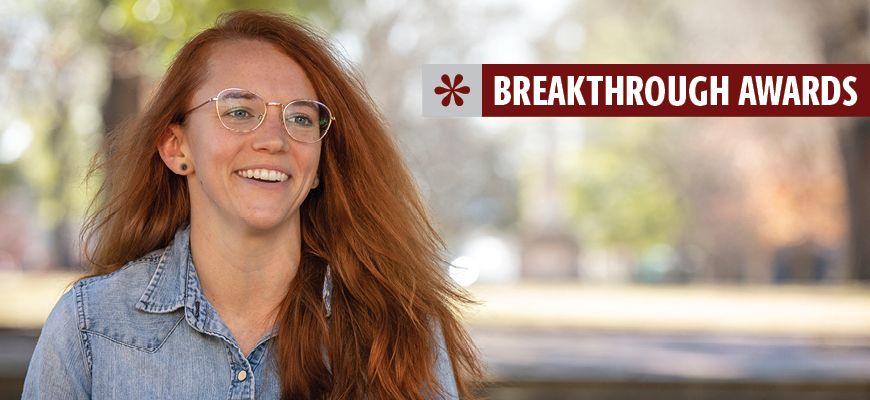
Breakthrough Star: Vanessa Kitzie
Researcher helps provide better health information to marginalized communities
Posted on: May 7, 2021; Updated on: May 7, 2021
By Page Ivey, [email protected], 803-777-3085
In just four years at the College of Information and Communications, Vanessa Kitzie has made quite a name for herself as a researcher. She focuses on how information institutions like libraries can better serve LGBTQIA+ people and communities, particularly in South Carolina.
First, she examines how members of this community — lesbian, gay, bisexual, transgender, queer, intersex and asexual — find and use health information. Then she looks at how public and medical libraries can use her research to collaborate with LGBTQIA+ people and communities for health promotion.
Part of her work calls on her previous work on online social question answering, like Yahoo! Answers and Wiki Answers. Librarians were trying to learn from these sites to improve their skills at providing information that was truly helpful.
What I always found personally as a doctoral student was I learned the most when I was actually doing — partnering with faculty and doing research and learning from them — so I have always wanted to provide those similar opportunities to current doctoral students.
Vanessa Kitzie
Kitzie worked to use text mining and other data to predict whether someone was going to be satisfied with the answer they received. The goal was to offer suggestions to the searchers of how to better frame their questions to improve their chances of getting the answers they sought.
“I realized a lot of the data we were scraping from sites, like Ask Jeeves, was really only the tip of the iceberg,” she says.
The suggestions for improving the question worked best when people were seeking fact-based answers, not so much when people were searching for support, advice or opinions, which accounts for the bulk of content people are seeking online.
“I was really curious in terms of what are LGBTQIA+ people asking on these forums and what are the answers they are providing and what information do people think is good information and what information do they think is bad information,” she says. Part of her reason for choosing LGBTQIA+ people and communities, she says, is that she identifies within the LGBTQIA+ umbrella.
Her work has garnered more than $650,000 in external funding, which puts her well beyond her peers in the field, says David Lankes, director of the School of Information Science.
“The fact that the funding comes from the top federal funder in library and information science, the Institute for Museum and Library Services, and includes their most prestigious award — the Early Career Development Award — puts her beyond all but a handful of her untenured peers across the country,” Lankes says. “Kitzie’s research into the marginalized with an eye toward critical theory and impact does the university proud.”
That impact on the communities she is studying is key, says Kim M. Thompson, associate dean for academic affairs in the School of Information Science.
“In our field, research is often used to provide solutions to practical problems in society,” Thompson says. Kitzie “advances the university mission of ‘innovative research’ and ‘creative engagement’ as she collaborates with practitioners in the South Carolina community, researchers in other universities, and, perhaps most importantly, with student researchers.”
Kitzie uses some of her external funding to support two doctoral students who work with her on her research.
“I really am a proponent of working with doctoral students whenever possible,” she says.
“What I always found personally as a doctoral student was I learned the most when I was actually doing — partnering with faculty and doing research and learning from them — so I have always wanted to provide those similar opportunities to current doctoral students.”
Learn more
Learn how public libraries can collaborate with LGBTQIA+ people and communities for health promotion and find training programs for LGBTQIA+ people to become community health workers and partner with medical librarians to create information resources for their communities.
Share this Story! Let friends in your social network know what you are reading about